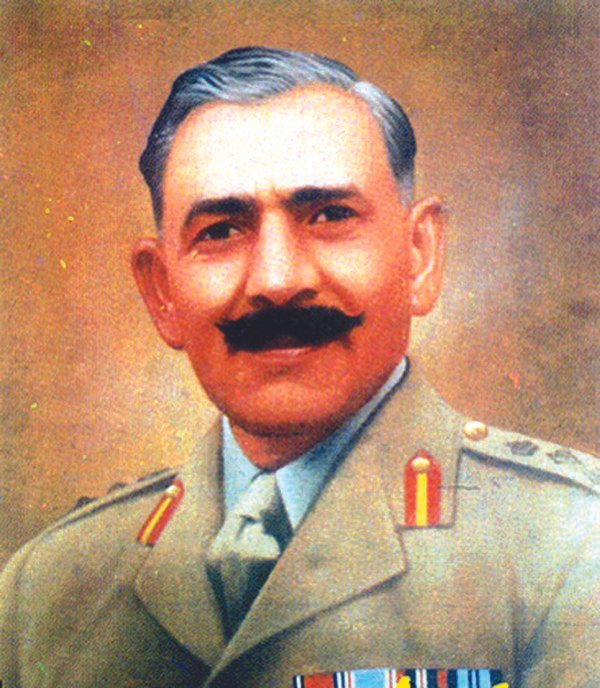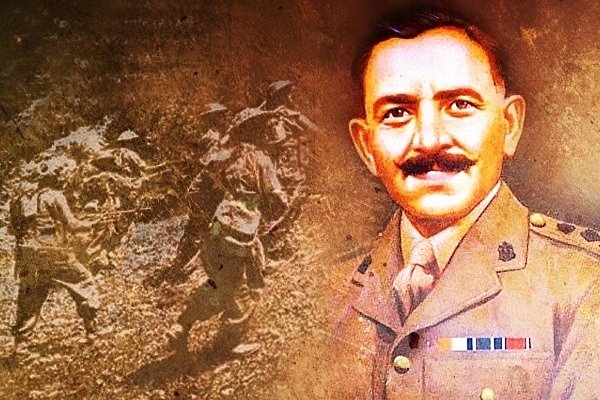Brig Rajinder Singh, MVC: The Saviour of Kashmir
Brigadier Rajinder Singh, MVC (Posthumous), is remembered as the Saviour of Kashmir, particularly during the month of October. Born on June 14, 1899, in Village Baguna (now Rajinder Pura), he was commissioned on the same day in 1921. In May 1942, he attained the rank of Brigadier and assumed the position of Chief of Staff of J&K State Forces on September 24, 1947, when the state was an independent entity. When Pakistan launched an attack on Kashmir on October 22, 1947, and news of the fall of Muzaffarabad reached Maharaja Hari Singh, he issued a crucial order to Brig Rajinder Singh:
ARMY ORDER
‘Brig Rajinder Singh is commanded to hold the enemy at Uri at all costs and to the last man.’
Following the order, Brig Rajinder Singh led a small force of a hundred men towards Muzaffarabad. After inflicting heavy casualties on the invading force, which numbered around 6,000, at Garhi, he made the decision to blow up the Uri bridge. This act aimed to delay the Pakistani forces, giving Maharaja Hari Singh an opportunity to engage in Accession Parleys with India and allow the Indian Army to ultimately save the state and repel the invaders.
By demolishing the Uri Bridge, Brig Rajinder Singh fought delaying actions at Uri, Mahura, and Rampur, inflicting heavy casualties on the enemy and buying valuable time. However, on the night of October 26/27, 1947, he was ambushed at Buniyar and gravely wounded. Yet, before his final action, he achieved a miracle—the Indian Army landed within six hours to save the state. Brig Rajinder Singh embodied the essence of the order ‘To the Last Man,’ becoming the literal last man and setting an example unmatched in the world. It is worth noting that it was also on October 26, 1947, that Maharaja Hari Singh acceded J&K to the Indian Union after Brig Rajinder Singh, his Chief of Staff, had saved Kashmir. Brig Rajinder Singh thus became the Saviour of Kashmir and was posthumously awarded the first Gallantry Award of independent India.
Brig Rajinder Singh’s contribution to the making of modern India is significant. Maharaja Gulab Singh, the founder of the unique state, included the most strategic area now known as the Northern Areas, which was acceded to India on October 26, 1947, thanks to the efforts of Brig Rajinder Singh.
Maharaja Hari Singh also played a crucial role in shaping history. The Dogra rulers consistently resisted British attempts to gain control over the state, particularly during Maharaja Partap Singh’s reign. Even during World War II, when the British sought control over the strategic Gilgit region, Maharaja Hari Singh only leased the area for 40 years. The British government returned control just before India’s Independence in July 1947. Maharaja Hari Singh appointed Brig Ghansara Singh as Governor of Gilgit, who continued in that role until November 1, 1947, despite the invasion of Kashmir by Pakistan on October 21, 1947. Brig Rajinder Singh, as the Chief of Staff of J&K State Forces, successfully delayed the enemy’s advance until October 26, ensuring that Gilgit remained with India during the accession process. Once again, Brig Rajinder Singh’s actions were crucial in saving Kashmir.
If the Indian government had sent a company of troops to Gilgit before November 1, 1947, Gilgit and Baltistan would never have been lost, as Pakistan never conquered those areas. However, due to the revolt led by Major Brown, Commander of the Gilgit Scouts, serving under the Governor of Gilgit, on November 1, the entire Baltistan region was handed over to Pakistan without a fight. Thus, Maharaja Hari Singh’s signing of the Instrument of Accession, legally and constitutionally acceding the entire state to the Indian Union, stands as a unique contribution to history. This accession forms the only legal authority for India to retain the state or eventually reclaim the lost areas, perhaps even in the 21st century, as events unfold. The person who made all of this possible was Brig Rajinder Singh.
Today, we pay tribute to the Saviour of the State, Brig Rajinder Singh, MVC (Posthumous), who was rightfully bestowed with the independent nation’s first Gallantry Award—a source of immense pride for the state. It is worth revisiting two tributes paid to him on his Birth Centenary, celebrated by the state from June 14, 1999, to June 14, 2000, immediately after the Kargil War. These tributes are particularly relevant for the younger generation:
Dr. Farooq Abdullah, the Chief Minister at the time and now a Union Minister for Renewable Energy, paid his respects:
“Today, we remember Brig Rajinder Singh Ji. We also have the opportunity to remember the officers and soldiers who have defended our state so that we can sleep in peace. They are prepared to lay down their lives in our defense. It is necessary to remember them and acknowledge their difficulties.
If we have attained and preserved our freedom, it is only due to the sacrifices of brave soldiers like Brig Rajinder Singh. His MVC is being upgraded to Param Vir Chakra, but even the Bharat Ratna is insufficient for him. I am amazed at times by those who receive the Bharat Ratna and those who are denied it. God willing, one day, this will be corrected.
I believe that in the future, we must establish a ‘Veer Memorial.’ This memorial should be grand and imposing, where we can all pay homage on August 15 and January 26. I would also like all newly married couples, regardless of their religion, to visit the Veer Memorial as the first step in their married lives. There, they should bow their heads in reverence to all those who shed their blood and made sacrifices, expressing their gratitude. It is they who enable newlyweds to begin their lives in peace.”
Dr. Karan Singh, Member of Parliament, former Union Minister, and Sadar-i-Riyasat of J&K State, who serves as the Grand Patron of the Jammu & Kashmir Ex-Services League, also paid tribute:
“He was indeed a hero of our times, gallantly holding off the invaders for several days, preventing the Kashmir valley from falling into hostile hands before the instrument of accession could be signed.
I was present in Gulab Bhavan Palace, Srinagar, when Brig Rajinder Singh came to receive final instructions from my father, which he carried out to the last drop of his blood. His role in saving the valley will be remembered in golden letters in military history.”
The historic army order issued by my father reads as follows:
‘Brig Rajinder Singh is commanded to hold the enemy at Uri at all costs and to the last man.’
Brig Rajinder Singh, MVC (Posthumous), truly epitomized bravery and sacrifice, and he will forever be remembered as the hero who saved Kashmir.

